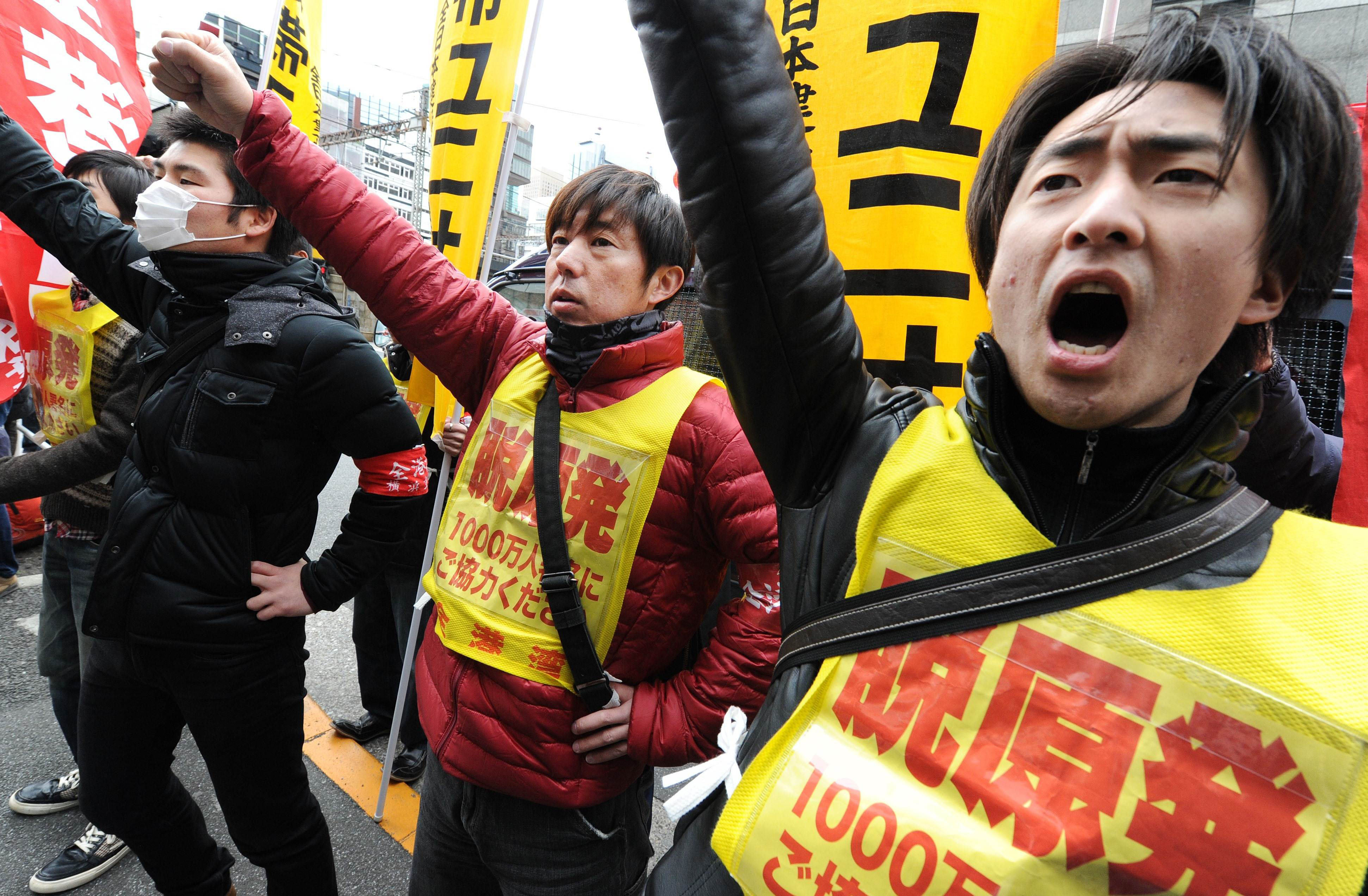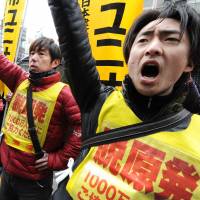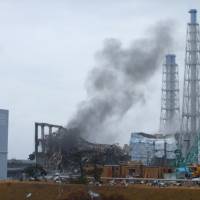Torn between his nationalistic instinct to resurrect what he seems to regard as Japan's great bygone days of empire-building and the mundane demands of caring for the pressing needs of his nation, a remarkably caring soul might almost feel sorry for Prime Minister Shinzo Abe during his first months in office. Almost.
However, after months of bluster and bragging, of tired claims that "Japan is back" and "Abenomics" will set the nation on its feet, the head of the ruling Liberal Democratic Party remains unable to get his priorities right.
If he hopes to create a sustainable economy, gain the global respect he so desperately craves, and give Japan's residents a sense of optimism about the future, he needs to put aside his ill-conceived notions of grandeur and focus on a practical, long-term domestic vision.
To meet the majority's demands for safe, secure energy, that vision must include a comprehensive blueprint for transitioning from nuclear power to clean, safe and localized energy generation.
Three years have passed since the Great East Japan Earthquake on March 11, 2011, and the following tsunami and nuclear catastrophe that shattered the Tohoku region, and more than 265,000 citizens of the world's third-largest economy remain displaced and largely living in subsistence-level accommodation.
These refugees and their communities deserve immediate attention. Restarting nuclear reactors won't help them, but jumpstarting their local economies with alternative-energy projects can — including solar, wind, water and geothermal opportunities.
The three reactor meltdowns at the Fukushima No. 1 nuclear power plant operated by Tokyo Electric Power Co. (Tepco) have turned parts of that prefecture into lethal no-go zones and are contaminating surface and groundwater with radioactivity that has now long been pouring into the Pacific. These ongoing calamities, too, need immediate attention.
The answer is not to simply switch the nation's energy dependence to other aging reactors in other communities, but to quickly and safely decommission all Japan's reactors that are disasters waiting to happen. The sooner this happens the better, as it will give Japan an opportunity to showcase new technologies and strategies that can be sold worldwide as other nations struggle to shut down and clean up antiquated reactors.
Rather than traveling the world to hawk Japanese nuclear reactors — a tainted brand at best — Abe needs to listen to the 70 percent of Japanese who polls show are hoping for a nuclear-free future.
Their hopes, and Abe's dreams of greatness, can dovetail in the development of alternative-energy technologies paired with reactor decommissioning strategies that must, by necessity, be perfected in Japan.
Today, a lack of political will is all that stands in the way of Japan becoming the world's leading incubator for safe and clean energy generation — a role that would spur the economy and ensure long-term national and energy security.
Of course, nuclear power will remain with us worldwide for years to come, and reasonable arguments can be made for its continued use as we phase-in safer forms of energy generation: one being the critical need to reduce carbon-dioxide emissions that come from burning fossil fuels such as coal and oil and are driving climate change.
Japan, however, is the last nation on Earth that should harbor hubristic dreams of extending the life of aging reactors and postponing the decommissioning process.
The 3/11 Tohoku quake and tsunami were not unique. Beneath Japan, massive tectonic plates grind against each other unrelentingly, rattling and jolting the entire land mass with continual tremors. For most of us here, it's a no-brainer to adopt a new energy paradigm. But this is not about brains — it's about politics.
Entrenched special interests, the so-called "nuclear village" comprising politicians, bureaucrats, media profiteers and executives of the nation's utilities, have much to lose, politically and financially, if energy is advanced and decentralized.
So, you might ask, is there any cause for optimism in Japan?
Well, that depends on what makes you optimistic. From my perspective, one bright spot is that groups both inside and outside Japan have begun chipping away at its traditional facade of wa — a cultural sense of harmony that tends to inhibit protest and reform.
In the March 11 edition of The Japan Times, David McNeill reported on a $1 billion class-action lawsuit filed against Tepco by 80 U.S. Navy personnel.
The sailors were part of Operation Tomodachi (Friend), a massive relief effort undertaken by the U.S. military following the earthquake and tsunami in 2011. McNeill explained that most of the plaintiffs were serving on the giant (nuclear-powered) USS Ronald Reagan aircraft carrier in the Pacific, downwind of the Fukushima No. 1 plant, and are now suffering illnesses that include leukemia, testicular cancer, brain cancer and brain tumors.
"The suit claims Tepco was negligent about safety and lied to the sailors and the public about radiation levels at the Fukushima No. 1 plant at the same time as Japan was asking for help for the victims of the earthquake and tsunami," wrote McNeill.
Lawyers for the sailors have said that "the utility knew the plaintiffs were going to be exposed to unsafe levels of radiation because it was aware that the plant had experienced a triple meltdown, and chose to keep it secret," McNeill reported.
Proving with sufficent likelihood to win a civil suit that radiation from the Fukushima meltdowns caused the sailors' illnesses will be a difficult legal hurdle, but simply filing the lawsuit — in a U.S. court in San Diego, California, on Feb. 6 — will keep Tepco and the Japanese government in the headlines and on the defensive regarding nuclear power.
From inside, too, Japan's traditional nonlitigious veneer is cracking. Last week it was reported that a class-action lawsuit has been filed in Japan against General Electric Co., Toshiba Corp. and Hitachi Ltd.
A statement released by the plaintiffs' Japanese lawyers claims that the three companies "failed to implement safety improvements to the 4-decade-old boiling-water reactors at the Fukushima No. 1 power plant," according an AFP-Jiji report in The Japan Times on March 14.
The lawsuit represents more than 4,000 individuals from Japan and 32 other nations, and seeks a symbolic ¥100 for each claimant.
While neither lawsuit is likely to bring down the walls of the nuclear village, both raise embarrassing questions for Abe, his Liberal Democratic Party and Japan's utilities. And both are also likely to spawn more legal claims.
For those who prefer less confrontational, more pragmatic approaches, however, other initiatives are also already under way. Last week, Japan's national Kyodo news service reported that a coalition of 38 green-power advocacy groups are cooperating to create an association that will focus on information-sharing in order to hasten the nation's independence from nuclear power.
"We want to create a concrete step to realize calls to break away from nuclear energy by generating electricity in communities," Tetsunari Iida, one of the organizers of the plan, told Kyodo. Iida is executive director of the Institute for Sustainable Energy Policies.
Contrary to Abe's present mind-set, a truly strong Japan going forward will require much less jingoism and considerably more support for this nation's local communities to pursue safe, clean and adaptable energy solutions.
Stephen Hesse is a professor in the Law Faculty of Chuo University and associate director of Chuo International Center. He can be reached at [email protected].



















With your current subscription plan you can comment on stories. However, before writing your first comment, please create a display name in the Profile section of your subscriber account page.